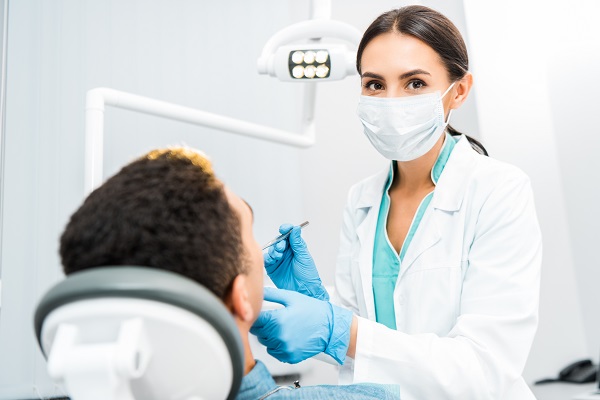Laser Dentistry: How Are Lasers Used During a Deep Cleaning?

Laser dentistry can treat a variety of dental conditions, including gum disease. More dentists are now using lasers in dental procedures because of their benefits. Laser dentistry can be beneficial for some patients more than other treatments. Read on to learn more about laser periodontal therapy.
Laser dentistry
Several factors can cause gum disease, or periodontitis, including poor oral hygiene. If the bad bacteria in the mouth is left untreated, plaque will continue to build up. It can then turn into tartar and gingivitis and even the more serious periodontal disease. Many individuals have symptoms of the condition before even realizing they have it.
Signs and symptoms of gum disease include bleeding, tender, red, or swollen gums. Some people also have persistent bad breath or loose teeth. Other symptoms include gums that pull away from the teeth or recede or pus between the teeth and gums. There are many effective treatment options for gum disease.
Scaling and root planing
The treatment options range from less invasive, nonsurgical treatments to more invasive ones like surgery. Deep cleaning is also known as scaling and root planing. It is a common nonsurgical treatment option for the condition. It is a thorough cleaning of tooth root surfaces to remove tartar and plaque from around teeth as well as the periodontal pockets in the gums. It can also help to smooth the roots of teeth to remove bacterial toxins. Pocket reduction or flap surgery is another common treatment option for gum disease.
How laser periodontal therapy works
Dentists use lasers to access and then remove the inflamed gum tissue from around the tooth root. Root scaling will start after the provider removes the infected tissue and the root is exposed. Scaling involves scraping off the plaque and calculus from below the gumline and around the root. The roots will be smoothed with instruments to remove rough spots.
Benefits
There are many benefits of laser dentistry treatment. The use of lasers can result in less swelling, discomfort, and bleeding than other treatment options. But some medical professionals do not support the use of this form of therapy. There is insufficient evidence that any laser wavelength is better than traditional treatment.
After the procedure, patients should follow aftercare instructions as closely as possible. Patients should often visit the dentist. Maintaining good oral hygiene practices will also be beneficial. It will make sure that a patient does not get gum disease once again. Brushing and rinsing regularly is important. To reduce the risk of future infections, patients should also not smoke.
Contact your dentist today
Laser treatment is still relatively new, and it is not regarded to be a proven treatment method. But some studies show that it can be effective in treating gum disease. Patients may benefit from periodontal laser therapy more than other traditional treatment options. Contact your dentist today to find out more about the risks and benefits of laser dentistry.
Are you considering laser dentistry in the Stuart area? Get more information at https://drdelucia.com.
Check out what others are saying about our services on Yelp: Read our Yelp reviews.
Related Posts
Dental implants are an innovative solution for replacing missing or damaged teeth, offering a long-term restoration that blends seamlessly with natural tooth structure. These implants rely on integration with the jawbone for stability and functionality. After receiving a dental implant, dentists recommend certain steps to support a comfortable and successful recovery.During the first 24 hours,…
Dental implants provide a durable and long-lasting solution for missing teeth, but like natural teeth, they can be damaged under certain circumstances. Trauma, excessive pressure, or complications with the surrounding structures may compromise the integrity of an implant. Understanding what to do in the event of damage can help prevent further issues and protect oral…
Teeth whitening appeals to everyone with a dull smile, including those with sensitive teeth. While it remains a viable stain-lifting option, sensitivity-prone patients should approach treatment with caution to avoid irritation while still improving smile brightness. Custom take-home trays from a general dentist help control dosage and fit, reducing many common triggers of sensitivity.The teeth…
Dental implants can be an effective and aesthetically pleasing long-term solution for missing teeth. However, misconceptions about implants can make some hesitant to consider them. In order to help patients make an informed decision, it helps to dispel some common myths about dental implants.One of the biggest concerns people have about dental implants is pain.…
